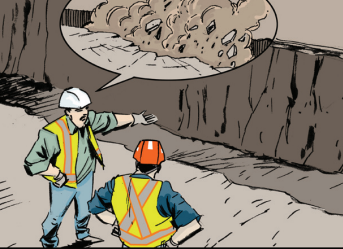
Image from WorkSafeBC’s Excavation Safety booklet
A 31-year-old man died on a residential construction site in Coquitlam, BC, on Feb. 23 when a trench collapsed on him. The Province reported that he was digging the trench for a sewer line when the soil caved in around him. Paramedics used hand tools to free him, then attempted CPR, but he died at the scene.
This tragic incident is still under investigation by WorkSafeBC, the Coquitlam RCMP, and the BC Coroners Service. Even though we don’t yet have all the answers, we know it’s incredibly sad for his loved ones. The effect of a sudden tragedy spreads through a community, touching many, and my heart goes out to everyone affected by this loss of a young life that ended much too soon.
For more information you can download Safe Work Practices for Excavation and Seven Steps to Excavation Safety, and other toolbox talks on excavation from the BC Construction Safety Alliance.
“Adequately installed shoring is a reliable method for protection from trench collapse,” says Candice Brown, safety and injury management advisor with the BC Construction Safety Alliance.
“The stability of trench walls can be compromised by many factors, some including vibration, weather conditions, soil type, and weight of equipment, materials, and other structures in proximity to the cut.”
Candice points out that trench work is a fairly common activity in construction, which means the high nature of the risk could easily be forgotten.
“A trench cave-in can be fatal even to a worker who is partially buried, as the pressure from the surrounding soil restricts breathing, and can cause asphyxiation,” she says. “Rescue is often difficult, as others would be putting their own lives at risk by climbing in to dig someone out.”
Please think about this and share it with anyone who needs to know.


